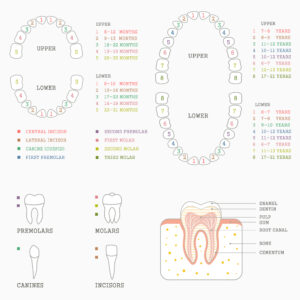As a parent, you want to make sure your children are healthy, happy, and hitting every milestone. This is why one of the most common dental questions parents have is when are their kids’ teeth going to come-in, fall-out, or be replaced by their adult teeth. First and foremost, the most important thing to consider is that much of the data you will find online is based on averages. Kids’ teeth can come in early or late and it isn’t necessarily an issue. If you are ever concerned about your children’s teeth you should consider going to a dental office near you and having the dentist perform a dental exam. X-rays and exams can help make sure your child’s teeth are developing properly. Here are a few answers to some of the most common questions about tooth eruption.
When Do Baby Teeth Come In?

Baby teeth also called primary teeth are the first set of teeth that come in. Altogether there are a total of 20 baby teeth that our kids have. The first group of teeth to come in are the top two and bottom two incisors. They are closely followed by the lateral incisors. Typically the first molars come in right before the canines (the pointed teeth that are between the incisors and the molars). Between age two and two-and-a-half all twenty teeth should erupt. It is recommended that you start bringing your child to the dentist either when their first tooth erupts or when they are six months old (whichever happens first). Again it is common for teeth to come in early or late, which is why the above chart uses ranges of time. Teeth can also come in a different order. You should really only be concerned if, after your child’s third birthday, they are missing teeth. Regular pediatric dental visits can help ensure that your kid’s teeth are being checked and are coming in healthy.
When Should My Child’s Teeth Fall Out?
A child’s secondary teeth or adult teeth, come in after the baby teeth fall out. Around age 6 or 7 is when your child will start losing their baby teeth. Excluding the wisdom teeth, your child will likely have all of their adult teeth around age 12. There are a total of 28 teeth in an adult’s mouth (excluding wisdom teeth). So aside from replacing the original 20 teeth, new molars will also erupt. In fact, the baby molars will be replaced with pre-molars. A pre-molar has two points instead of four and they separate the molars from the canines. Altogether your teenager will have four eight central incisors, four lateral incisors, four canines, eight premolars, and eight molars (excluding the wisdom teeth). The first teeth to fall out tend to be those central and lateral incisors, and around the same time, the first molars will erupt behind the baby molars. Premolars will replace the baby molars and canines will be replaced soon after as well. Finally, the second molars will come in when your child is a pre-teen. When your child is around 18 years old they might have wisdom teeth (third molars) erupting, however, many people are born without them, and many other people need to have them removed as their mouths are unable to fit this final group of teeth.
Why Hasn’t An Adult Tooth Come-In After A Baby Tooth Fell Out?
If your child loses a baby tooth but the adult tooth doesn’t erupt, that doesn’t mean they are missing tooth. Often this can be caused by crowding. For example, if they lose a central incisor (especially the lower ones) the surrounding incisors might be blocking the larger adult tooth. In these cases, you should talk to your dentist at your child’s next regular check-up. A dentist can take a look and decide if the best course of action is waiting for the other teeth to fall out or potentially extracting teeth. You should never try to force a baby tooth out yourself.
Why Does My Child Have Two Rows of Teeth?
Two rows of teeth or “shark teeth” as they are sometimes called refers to when a secondary tooth comes in behind the baby tooth. This can be caused by an issue with the baby tooth not falling out and the adult tooth being forced to grow in behind. It can also because by a baby tooth falling out but another adjacent tooth blocking the way for the new adult tooth. If your child has two rows of teeth, this is common, what you should do is talk to your dentist. Again a dentist can decide if the best option is tooth extraction for the baby teeth or if it would make more sense to wait for the teeth to fall out naturally.
Schedule Family Dental Appointments in Chicago
If you live in Chicago and need to see a dentist or have questions about your child’s dental health, we would be happy to help. We provide a variety of dental services for kids, teens, and adults at our 8 offices throughout the Chicago area.
